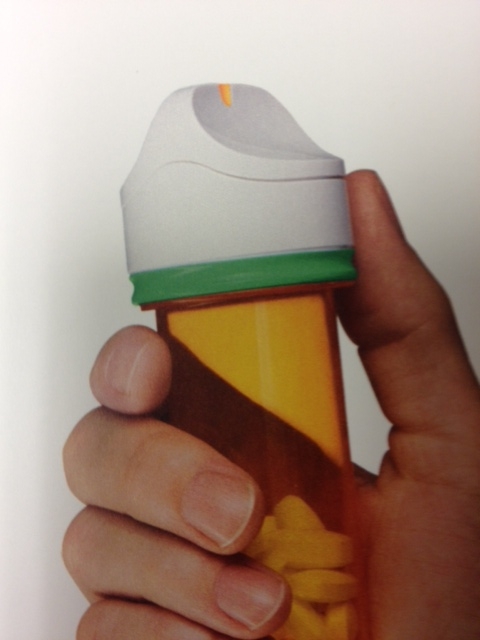December 25th, 2011 by DrWes in News, Opinion
No Comments »


 Just saw this advertised for patients taking Multaq (dronedarone): interactive pill bottle caps called “GlowCaps:”
Just saw this advertised for patients taking Multaq (dronedarone): interactive pill bottle caps called “GlowCaps:”
GlowCapsTM is a bottle with built-in wireless communication… When you receive your GlowCapTM, you program it with your schedule. It will then remind you when it’s time to take Multaq by lighting up, playing a melody, or calling your home phone. If you and your physician choose, your GlowCapTM can also send weekly reminder e-mail to you and a caregiver, send reports to your doctor, and refills can be initiated with the push of a button, if you provide a phone number when registering.
Okay. That’s pretty cool.
How It Works Read more »
*This blog post was originally published at Dr. Wes*
November 22nd, 2011 by DrWes in News, Opinion
No Comments »

From Medgadget via The Medical Quack:

EBR Systems, a start-up out of Sunnyvale California, and Cambridge Consultants, the technology design and development firm, have developed a leadless pacemaker system for patients with advanced heart failure. The Wireless Cardiac Stimulation System (WiCS) comprises two units, an implantable electrode and an external control unit. The electrode incorporates an ultrasonic, wireless receiver and delivers an electrical stimulus to the heart based on triggering signals from the external control unit.
In its current iteration the WiCS system is designed to work with conventional pacemakers/defibrillators pacing the right ventricle of patients requiring biventricular pacing. The WiCS external control unit senses the pacing stimulus delivered to the right ventricle and initiates a burst of stimulus from the electrode implanted in the left ventricle. According to the company, Read more »
*This blog post was originally published at Dr. Wes*
October 1st, 2011 by Jessie Gruman, Ph.D. in Opinion
No Comments »

 Emerging from a foggy year of treatment for stomach cancer, I am vividly aware of how much time and energy it takes to meet the daily demands of a serious illness. When I think back over the past 35 years and my treatment for now four different cancer-related diagnoses, I am amazed by how much has changed. The diagnostic and treatment technologies are light years more sophisticated and effective.
Emerging from a foggy year of treatment for stomach cancer, I am vividly aware of how much time and energy it takes to meet the daily demands of a serious illness. When I think back over the past 35 years and my treatment for now four different cancer-related diagnoses, I am amazed by how much has changed. The diagnostic and treatment technologies are light years more sophisticated and effective.
I am also taken aback by how much more we, as patients, and our loved ones who care for us, must know and do to organize and administer our own care in response to a serious diagnosis.
From an economic standpoint, this makes sense: the marketplace drives innovations to become simpler and cheaper. In modern American health care, this means that new drugs, technologies and procedures are re-engineered so they can be offloaded from expensive professionals to patients and those who care for them – and who work for free.
Think about it: Read more »
*This blog post was originally published at Prepared Patient Forum: What It Takes Blog*
September 17th, 2011 by Berci in Health Policy, Interviews
No Comments »

Pascal Lardier, International Director of Health 2.0 asked me for an interview about the future of health 2.0. Here is the interview and an excerpt:
Basically, the medical acts remain the same: doctors will continue to receive their patients. But both stakeholders need to adapt and be able to deal with the rapidly growing amount of information available online. As the patient’s motivation is clearly more important (their health is at stake), they are more open to these innovations/developments while medical professionals use the internet and social media for other purposes: education, collaboration, diagnostic technologies, etc… Patients and doctors basically use the same type of technologies for different purposes. I’m sure social media, used with strategy and caution, will help fill the gap between patients and their physicians.

*This blog post was originally published at ScienceRoll*
 Just saw this advertised for patients taking Multaq (dronedarone): interactive pill bottle caps called “GlowCaps:”
Just saw this advertised for patients taking Multaq (dronedarone): interactive pill bottle caps called “GlowCaps:”




 Emerging from a foggy year of treatment for stomach cancer, I am vividly aware of how much time and energy it takes to meet the daily demands of a serious illness. When I think back over the past 35 years and my treatment for now four different cancer-related diagnoses, I am amazed by how much has changed. The diagnostic and treatment technologies are light years more sophisticated and effective.
Emerging from a foggy year of treatment for stomach cancer, I am vividly aware of how much time and energy it takes to meet the daily demands of a serious illness. When I think back over the past 35 years and my treatment for now four different cancer-related diagnoses, I am amazed by how much has changed. The diagnostic and treatment technologies are light years more sophisticated and effective.











